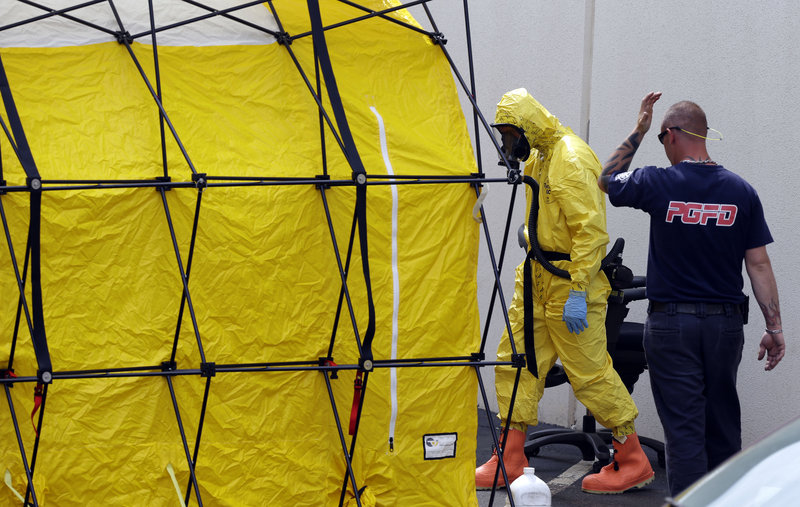OXFORD, Miss. – A Mississippi man was arrested Wednesday, accused of sending letters to President Obama and a senator that tested positive for the poisonous ricin and set the nation’s capital on edge a day after the Boston Marathon bombings.
FBI Special Agent in Charge Daniel McMullen said Paul Kevin Curtis, 45, was arrested at 5:15 p.m. at his apartment in Corinth, near the Tennessee state line about 100 miles east of Memphis. It wasn’t immediately known where he was being held.
Authorities still waited for definitive tests on the letters to Obama and Sen. Roger Wicker, R-Miss. Preliminary field tests can often show false positives for ricin. The letters were intercepted before reaching the White House or Senate.
An FBI intelligence bulletin obtained by The Associated Press said those two letters were postmarked Memphis, Tenn.
Both letters said: “To see a wrong and not expose it, is to become a silent partner to its continuance.” Both were signed, “I am KC and I approve this message.”
As authorities scurried to investigate three questionable packages discovered in Senate office buildings, reports of suspicious items also came in from at least three senators’ offices in their home states.
Sen. Carl Levin said a staff member at his Saginaw, Mich., office would spend the night in a hospital as a precaution after discovering a suspicious letter. The staff member had no symptoms, Levin said in a statement. He expected to learn preliminary results of tests on the letter by Thursday.
Sen. Jeff Flake, R-Ariz., said suspicious letters at his Phoenix office had been cleared with nothing dangerous found. A package at Sen. John Cornyn’s Dallas-area office also was declared harmless, a fire department spokesman said.
All three packages in the Capitol complex turned out to be safe, Capitol police spokeswoman Makema Turner said late Wednesday. But a man was still being questioned after being stopped in connection with the packages, she said.
All the activity came as tensions were high in Washington and across the country following Monday’s bombings at the Boston Marathon that killed three people and injured more than 170. The FBI said there was no indication of a connection between the letters and the bombing. The letters to Obama and Wicker were postmarked April 8, before the marathon.
Obama’s press secretary, Jay Carney, said mail sent to the White House is screened at a remote site for the safety of the recipients and the general public. He declined to comment on the significance of the preliminary ricin result, referring questions to the FBI.
Capitol Police swiftly ramped up security, and lawmakers and staff were cautioned away from some parts of the Hill complex. After hours of jangled nerves, officials signaled it was safe to move throughout the area and people settled back to normal, if watchful, activity.
Senate Sergeant-at-Arms Terrance Gainer said that an individual who was responsible for simultaneous suspicious-package incidents in the Hart and Russell Senate office buildings on Tuesday was detained and released on Wednesday. The packages were not hazardous.
Gainer said the man was “not particularly harmful, although terribly disruptive.”
At a House hearing, Postmaster General Patrick Donahoe noted there had been ricin alerts since the notorious 2001 anthrax mailings and procedures are in place to protect postal employees and help track down culprits.
“Over the course of years we’ve had some situations where there have been ricin scares,” Donahoe said. “Until this date, there’s never been any actually proved that have gone through the system.”
Even during the flurry of concern, normal business continued across most of the Capitol and its office buildings, with tour groups passing through and visitors streaming in and out of Wicker’s office.
Amy Keough of Stow, Mass., and her family were searching for an open entrance to the Russell Senate Office building and walked by a U.S. Capitol Police hazardous materials vehicle. The Keoughs had been visiting Washington for several days, but Monday’s marathon bombing was on their minds.
“We don’t know really what it is that’s going on,” Keough said.
Send questions/comments to the editors.



Success. Please wait for the page to reload. If the page does not reload within 5 seconds, please refresh the page.
Enter your email and password to access comments.
Hi, to comment on stories you must . This profile is in addition to your subscription and website login.
Already have a commenting profile? .
Invalid username/password.
Please check your email to confirm and complete your registration.
Only subscribers are eligible to post comments. Please subscribe or login first for digital access. Here’s why.
Use the form below to reset your password. When you've submitted your account email, we will send an email with a reset code.